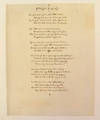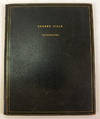signed first edition Letters
by FIELD, Eugene
First Edition. Letters. Contents Fine; binding with minor wear and Near Fine. A collection of 8 handwritten SIGNED letters to his wife, a handwritten SIGNED letter to a Mr. Lawson, a SIGNED MANUSCRIPT poem, a SIGNED portrait photograph, a SIGNED portrait etching, and miscellaneous pieces by Field, some neatly laid down, most tipped-in, in a 10" x 12" full black flexible morocco leather book with gilt lettering on the front cover and spine: "Eugene Field/Autographs." The poem is his "A Valentine to My Wife" and has a few minor changes from the published version. The letters to his wife are mostly dated 1872 and 1873, before he and Julia Comstock were married (truncated)









